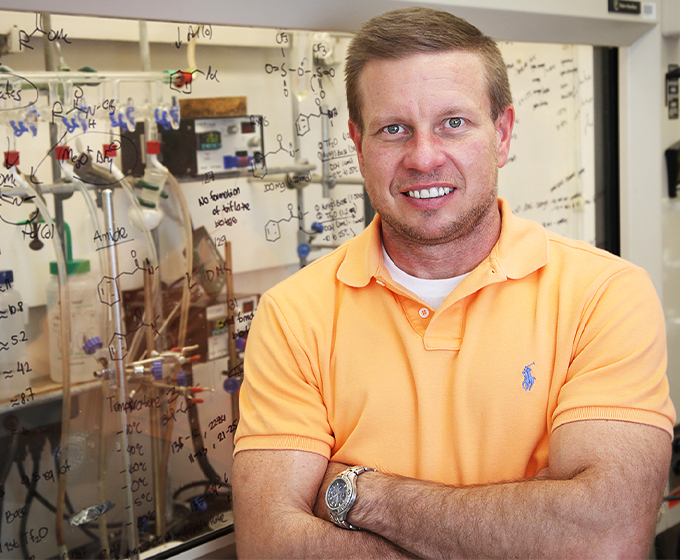
Doug Frantz holds the Max and Minnie Tomerlin Voelcker Distinguished Professorship in Chemistry.
JULY 20, 2020 — The trustees of the Max and Minnie Tomerlin Voelcker Fund have awarded the College of Sciences and chemistry professor Doug Frantz $883,000 to establish the Max and Minnie Tomerlin Voelcker CIDD Preclinical Pharmacology Core for Accelerated Drug Discovery. The core will be part of UTSA’s Center for Innovative Drug Discovery. Led by director Stanton McHardy, the CIDD catalyzes collaborations with investigators by providing services and expertise related to small-molecule drug discovery and preclinical drug development.
Researchers in the core will work with the CIDD’s High-Throughput Screening Core Facility and the Max and Minnie Tomerlin Voelcker Medicinal Chemistry Core Facility. They will also collaborate with UTSA’s Stem Core Facility to develop innovative technologies that determine the cardiovascular safety of all new drugs under development.
Preclinical pharmacology is a critical piece of the drug discovery pipeline. It allows researchers to optimize potential new drugs by studying various aspects of toxicology, including absorption, distribution, metabolism and excretion. Each of these is needed to file an Investigational New Drug application to the federal Food and Drug Administration.
Previously, the CIDD had to outsource all preclinical pharmacology, which resulted in significant costs and lengthy delays. The Voelcker Fund’s award will allow researchers to save valuable time and resources.
The Voelcker Fund supports research that finds cures for medical diseases. “The medical research capabilities of the CIDD are unlimited,” said Banks Smith, a Voelcker Fund trustee. “Its work accelerates the discovery of cures for diseases.”
Researchers in the CIDD will utilize the core’s cutting-edge late-stage preclinical pharmacology and translational drug development capabilities to launch new therapies in a broad range of indications, including cancer, cardiovascular disease, neurodegeneration, chronic pain and infectious diseases.
The addition of the core provides a unique suite of industry-level services to South Texas biomedical researchers. Frantz believes that the core will help establish new collaborative opportunities between UTSA, UT Health San Antonio, Texas Biomedical Research Institute and Southwest Research Institute.
“The Max and Minnie Tomerlin Voelcker CIDD Preclinical Pharmacology Core for Accelerated Drug Discovery will provide the missing link in San Antonio’s drug-discovery ecosystem and allow local researchers to rapidly identify the best drug leads to move forward into the clinic,” said Frantz.
⇒ Learn more about the Center for Innovative Drug Discovery at UTSA.
A portion of the funds will also support the CIDD Undergraduate Summer Internship, which offers a research-focused laboratory experience for undergraduate students. Student support accelerates research in fields such as cancer and heart disease.
“Under this new summer internship opportunity, selected undergraduate students in the College of Sciences will undergo an intensive 10-week hands-on laboratory experience to train them in the skills and techniques required for a successful career in the pharmaceutical industry,” said Frantz.
Frantz, who holds the Max and Minnie Tomerlin Voelcker Distinguished Professorship in Chemistry, cofounded the CIDD in 2012. Since that time, the center has participated in over 50 novel drug-discovery programs across a range of therapeutic areas, which has resulted in over 25 peer-reviewed publications, over 15 invention disclosures and more than $17 million in extramural funding.
UTSA Today is produced by University Communications and Marketing, the official news source of The University of Texas at San Antonio. Send your feedback to news@utsa.edu. Keep up-to-date on UTSA news by visiting UTSA Today. Connect with UTSA online at Facebook, Twitter, Youtube and Instagram.
Move In To COLFA is strongly recommended for new students in COLFA. It gives you the chance to learn about the Student Success Center, campus resources and meet new friends!
Academic Classroom: Lecture Hall (MH 2.01.10,) McKinney Humanities BldgWe invite you to join us for Birds Up! Downtown, an exciting welcome back event designed to connect students with the different departments at the Downtown Campus. Students will have the opportunity to learn about some of the departments on campus, gain access to different resources, and collect some giveaways!
Bill Miller PlazaCome and celebrate this year's homecoming at the Downtown Campus with food, games, giveaways, music, and more. We look forward to seeing your Roadrunner Spirit!
Bill Miller PlazaThe University of Texas at San Antonio is dedicated to the advancement of knowledge through research and discovery, teaching and learning, community engagement and public service. As an institution of access and excellence, UTSA embraces multicultural traditions and serves as a center for intellectual and creative resources as well as a catalyst for socioeconomic development and the commercialization of intellectual property - for Texas, the nation and the world.
To be a premier public research university, providing access to educational excellence and preparing citizen leaders for the global environment.
We encourage an environment of dialogue and discovery, where integrity, excellence, respect, collaboration and innovation are fostered.